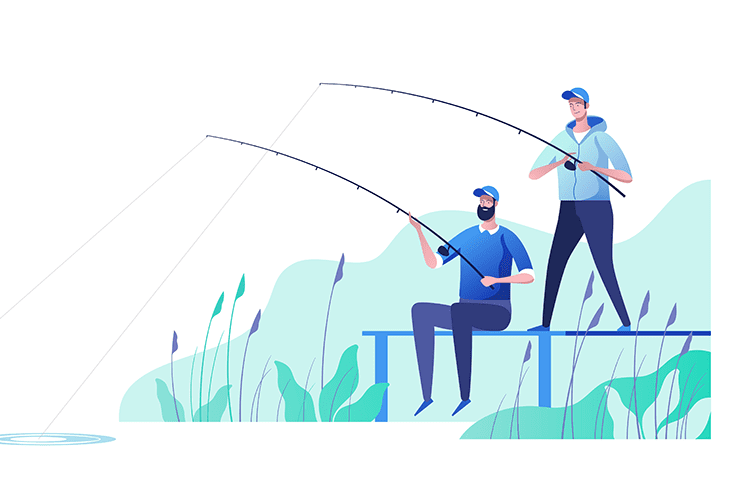January 28, 2022
By Kenneth Reaves

If you live with depression, you’ve likely been advised to seek time in nature (just one of many activities proven to boost emotional well-being). As a professional fisherman of over two decades — and as someone who has encountered mental health challenges in the past — I have witnessed how fishing can improve mental health in a similar way. This activity, which has become my life’s work, can offer physical health benefits, provide tranquil space for reflection, teach resilience and build community.
As I have navigated personal and professional successes and failures — and the resulting mental health implications — nothing has been more emotionally rewarding than fishing. I’ve found self-esteem in overcoming a challenging catch and support from meeting like-minded fisherman. I remember my first cast fondly, and I find comfort in recalling the sheer pleasure of handing myself over to nature while honing a new skill.
While fishing is, perhaps, not the most obvious choice for a self-care activity, I want to share what it has given me.
Studies show that physical activity, and the resulting improved physical health, has a direct, positive impact on mood and general well-being. You’ve likely heard stories about bikers, campers and various sports enthusiasts managing their mental health challenges through the activity they love. For me, fishing has delivered the same results.
Before getting into the art of fishing, I spent my free time oversleeping and sitting in front of a screen — and I paid the price with my physical health. However, since I began fishing, I have abandoned old habits and traded screen time for a form of physical activity.
Beyond offering a unique way to be physically active, fishing provides an opportunity to get outdoors and get in touch with your body. When I go fishing, I get the opportunity to clear my lungs and practice breathing exercises. At first, I was resistant to the idea that fishing could be meditative — especially when I would find myself wrangling a stubborn bass or sifting through buckets of tiny crabs. But I was wrong.
Breathing in fresh air and observing freshwater allows me to center myself and recharge. In fact, when I’m feeling lethargic, a trip to the lake gives me the burst of energy I need.
For me, fishing has become a critical part of my self-care to combat anxiety. When I cast a line and wait patiently for a bite, I am given a chance to practice mindfulness (a term I began hearing more amid the pandemic). Like many others, I have experienced my fair share of pandemic anxiety. Without opportunities to travel, my routine became stagnant, and I had fewer opportunities to be active. But fishing has consistently been a safe way to take time for myself — and it has reminded me of the importance of making deliberate choices for my well-being.
Fishing has also allowed me to overcome profound losses due to COVID-19. I have lost close friends, many of whom were avid fisherman, to the pandemic, and I find that returning to the sport has given me opportunities to reconnect with them, even in solitude.
Many of us who live with mental health conditions struggle with self-esteem and confidence. Perhaps we question our abilities and our self-worth and yearn for success or validation. Fishing, however, has given me a new perspective. When I began the sport, I wasn’t a natural — I made mistakes and often felt that I was “failing.” But practice and determination took me a long way. And I learned to enjoy the journey of mastering a new skill.
Improving your self-image isn’t easy, but trying a new activity can be a great way to start. There are challenges in learning a new sport, and you aren’t always going to see success, but seeing yourself through the challenges and watching your own progress can be empowering.
Consider fishing as a metaphor for overcoming your emotional struggles — there will be good days and bad ones, but success lies in pushing forward, one day and one skill at a time. Ultimately, one of my greatest takeaways from the sport is how emotional resilience puts you in charge of your growth.
In my time as a professional fisherman, I’ve learned that that there is a strong connection between one’s interpersonal relationships and their emotional well-being. Engaging in a beloved activity (or trying a new activity) while connecting with someone makes the experience even more enriching and often provides a deep sense of belonging.
Fishing can be a very social activity and provides it exciting opportunities to connect with and learn from a wide variety of people. I’ve met rookie and veteran fisherman from all walks of life — families, a woman recovering from breast cancer, a military veteran and backpackers traveling with their canine companions. I have developed friendships, and gained perspectives, I would not have found elsewhere. I’ve built a community, found support during tough times and I’ve even been given some incredible fish recipes.
Ultimately, I’ve learned that fishing isn’t just another hobby — it’s an opportunity to tap into new skills, grow your self-confidence and find a support system. After 20 years, I say confidently that it has allowed me to grow mentally and emotionally. In the wake of a turbulent two years and a global pandemic, many of us need to take a step back from our everyday routines and reflect in a tranquil space with people we can trust.
We’re always accepting submissions to the NAMI Blog! We feature the latest research, stories of recovery, ways to end stigma and strategies for living well with mental illness. Most importantly: We feature your voices.
LEARN MORENAMI HelpLine is available M-F, 10 a.m. – 10 p.m. ET. Call 800-950-6264,
text “helpline” to 62640, or chat online. In a crisis, call or text 988 (24/7).